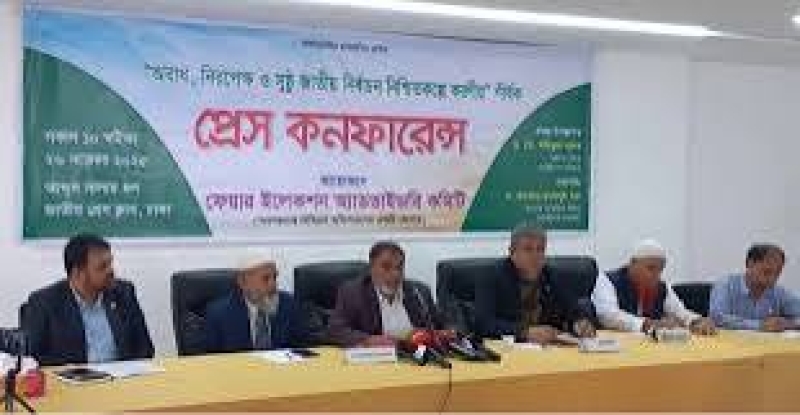- FIFA tweaks World Cup draw to keep top teams apart until Semis |
- Korail slum families lose everything to devastating fire |
- Recovered gold not only Hasina’s, but also family members’, says ACC |
- Dhaka breaths ‘very unhealthy’ air Wednesday morning |
- Referendum Ordinance, 2025 issued |
FEAC team holds meeting with Election Commission

The Fair Election Advisory Committee on Wednesday called upon the Election Commission and all relevant authorities to demonstrate the highest level of professionalism, neutrality and ethical conduct as the country prepares for the upcoming 13th National Parliamentary Election.
The organisation made the appeal at a press conference held at the Abdus Salam Hall of the National Press Club.
The briefing was chaired by Dr Khandaker Rashedul Haque, former additional secretary to the government and president of the committee.
The position paper was presented by the committee’s member-secretary, Dr Md Shariful Alam, former secretary to the government and currently a professor at Dhaka International University.
In its position paper, the Fair Election Advisory Committee outlined key priorities required to ensure a free, fair and acceptable election.
Dr Shariful Alam said the nation has endured three unacceptable national elections in 2014, 2018 and 2024, and is now waiting for a genuinely credible and impartial electoral process.
He noted that the Chief Adviser has already expressed his commitment to holding a free and fair election, and stressed that this commitment must be translated into action by the Election Commission and the field administration through the demonstration of utmost professionalism and integrity.
The committee presented several major recommendations necessary to uphold transparency and public trust in the electoral process.
It emphasised the urgent need to install online CCTV cameras in all polling centres, stating that given the current context, there is no alternative to robust surveillance for ensuring transparent voting.
Approximately 43,000 polling centres would require installation, which the committee estimated would cost around Tk 200 crore.
It argued that this expenditure is reasonable and justified compared to the scale of government development projects, and that the cameras could later be reused in educational institutions and future elections.
The committee suggested decentralising procurement through the Direct Purchase Method and delegating funds to Upazila Nirbahi Officers to ensure swift implementation.
The position paper further underscored the need to equip law enforcement personnel with body-worn cameras.
At least two officers deployed at each polling centre should be required to wear such devices, which the committee said would enhance accountability, improve monitoring of on-duty personnel and strengthen law and order management during the polls.
Another key recommendation concerned large-scale transfers and postings within the field administration. District Commissioners, Superintendents of Police, Upazila Nirbahi Officers, Officers-in-Charge and election officials should be reassigned through a lottery system to eliminate local bias and ensure neutrality.
The committee proposed that these officials be transferred again within 15 days after the election.
Those demonstrating complete neutrality and professionalism should be rewarded with important postings, while those failing to maintain impartial conduct should face exemplary disciplinary action.
The committee also urged the authorities to conduct a coordinated special drive to recover illegal firearms before the election schedule is announced.
It said the drive must continue until polling day to ensure that no group has the opportunity or courage to disrupt the electoral environment or attempt to capture polling stations.
Calling on all officials engaged in election duties to uphold the highest standards of honesty and neutrality, the committee stressed that government employees must remain free from any political or group influence while carrying out their responsibilities.
It urged the government, the Election Commission and the Cabinet Division to take necessary measures to create such an environment.
According to the Fair Election Advisory Committee, the July 2024 mass uprising has created an opportunity for the restoration of democratic practice in Bangladesh.
It said a credible election is crucial to fulfilling this aspiration and that all stakeholders must act responsibly to ensure a peaceful, transparent and acceptable electoral process.
The Fair Election Advisory Committee is an organisation composed of retired officers of the Bangladesh Civil Service and works on election observation.
The recommendations presented today were based on their extensive experience in administering elections and in light of the shortcomings observed in previous polls, reports UNB.

